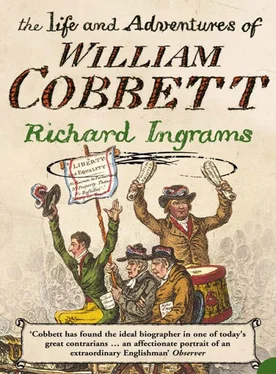1 ...6 7 8 10 11 12 ...20 As a journalist Cobbett was at his best when he could focus his animosity on a particular individual rather than a set of principles or ideas. This is not to say that he was uninterested in ideas, only that he needed someone, like Dr Priestley, to personify the particular variety of political hypocrisy he was attacking at any time. Labelled with appropriate nicknames, these favoured targets (mentioned at every opportunity) lent a powerful spice to his political journalism, making it compulsive reading even for his enemies. Many of the victims of his most savage attacks were not necessarily his political opponents, but had aroused his indignation by being humourless, puritanical in their attitude to morality or, above all, vain. Priestley was one such. William Wilberforce would later be another. A third was Noah Webster (1758–1843) of Webster’s Dictionary fame, a lexicographer, a grammarian, the author of a spelling book for American schools and the man responsible for the differences between American and English spelling (‘color’ for ‘colour’, etc.). Webster came from a family of strict Puritans and was highly industrious in any number of fields – though Jefferson called him ‘a mere pedagogue of very limited understanding’. Cobbett was even ruder, despite the fact that Webster supported the federalists, and missed no opportunity to call him names:
despicable creature … viper … mean shuffling fellow … were this man indeed distinguished as being descended from a famous race, for great learning and talents, for important public services, for possessing much weight in the opinions of the people, even his vanity would be inexcusable but the fellow is distinguished, amongst the few who know him, for the very contrary of all this. He comes of obscure parents, he has just learning enough to make him a fool, his public services have all been confined to silly, idle projects , every one of which has completely failed, and as to his weight as a politician, it is that of a feather, which is overbalanced by a straw, and puffed away by the gentlest breath. All his measures are exploded, his predictions have proved false, not a single sentiment of his has become fashionable, nor has the Federal Government ever adopted a single measure which he has been in the habit of recommending. 6
Webster later saw a chance of revenge following the passing of a Sedition Act by Washington in 1798 which made it illegal ‘to write, print, utter or publish any false, scandalous and malicious writing or writings against the Government of the United States’. Although the Act was intended to be used against French writers – by this time the USA had broken off relations with France and was preparing for war – Webster decided it could equally well be used against people like Cobbett. Affecting, like many of his type, not to have personally seen the attacks, he wrote to the Secretary of State Timothy Pickering: ‘The violence and resentment of the English knows no bounds. They are intolerably insolent and strive, by all possible means to lessen the circulation of my papers.’ (He need not have bothered, as by that stage proceedings were already under way.)
A more formidable opponent than Webster was Thomas McKean (1734–1817), a lawyer of Scottish descent who involved himself in politics, became one of the most ardent advocates of separation prior to the war with Britain, and was a signatory of the Declaration of Independence in 1776. The following year McKean became the Chief Justice of Pennsylvania (a post he occupied for twenty years), and he was elected President of Congress in 1781. Though a keen Democrat and francophile, McKean was deeply conservative in matters of law, besides being, in the words of his contemporary Thomas Rodney, a man ‘of great vanity, extremely fond of power and entirely governed by passions, ever pursuing the object present with warm, enthusiastic zeal without much reflection or forecast’. 7 A recent biographer describes him as ‘almost pathological in his insistence upon deference in his political and judicial capacities’. Among other insults, Cobbett called him ‘a little upstart tyrant’, or ‘Mrs McKean’s husband’ (the suggestion being that he was under the thumb of his dominating wife).
Already needled by these jibes, McKean was only too happy to act when his prospective son-in-law Don Carlos Martinez de Yrujo, the Spanish Ambassador, complained of certain disobliging comments which Cobbett made about himself and the Spanish King Charles IV, who had appointed him. On 18 August 1796 Cobbett was arrested and charged with criminal libel (the first of a long series of such setbacks). In a lengthy indictment McKean expressed his distaste not just for Cobbett but for all forms of satire against public figures (such as himself): ‘where libels are printed against persons employed in a public capacity they receive an aggravation, as they tend to scandalize the government by reflecting those who are entrusted with the administration of public affairs’. Political journalism had got quite out of hand, in McKean’s view:
Everyone who has in him the sentiments of either a Christian or a gentleman cannot but be highly offended at the envenomed scurrility that has raged in pamphlets and newspapers … in so much that libelling has become a kind of national crime, and distinguishes us not only from all the states around us, but from the whole civilized world …
Impressed with the duties of my station, I have used some endeavours for checking these evils, by binding over the editor and printer of one of them, licentious and virulent beyond all former example, to his good behaviour; but he still perseveres in his nefarious publications; he has ransacked our language for terms of reproach and insult, and for the basest accusations against every ruler and distinguished character in France and Spain, with which we chance to have any intercourse, which it is scarce in nature to forgive …
McKean created something of a precedent by appearing as both judge and witness at the trial, but despite this the jury sided with Cobbett by a majority of one. Not content with the verdict, McKean now made efforts to have Cobbett deported from the United States as an undesirable alien. When these failed he compiled a selection of Cobbett’s writings, including various alleged libels on public figures. Following a trial Cobbett was bound over for $4000 to be of good behaviour, at which point a more prudent man might have left McKean alone. Cobbett however was determined not to be silenced. He was especially eager to prove that despite the First Amendment the American press was no more free than the British. In a pamphlet, ‘The Democratic Judge’ (1798), he railed against the iniquity of the proceedings, pointing out ( inter alia ) that his comments about the King of Spain and his Ambassador were mild stuff compared to some of the scurrilous comments on George III and his allies which McKean had allowed freely to circulate. In the English edition (copies of which no doubt reached America) Cobbett tore into McKean in what must be one of the most defamatory attacks ever launched against a public figure:
His private character is infamous. He beats his wife and she beats him. He ordered a wig to be imported for him by Mr. Kid, refused to pay for it, the dispute was referred to the court of Nisi Prius ; where (merely for want of the original invoice which Kid had lost) the Judge came off victorious! He is a notorious drunkard. The whole bar, one lawyer excepted, signed a memorial, stating, that so great a drunkard was he, that after dinner, person and property were not safe in Pennsylvania . He has been horsewhipped in the City Tavern, and kicked in the street for his insolence to particular persons; and yet this degraded wretch is Chief Justice of the State!
Читать дальше











